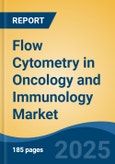Speak directly to the analyst to clarify any post sales queries you may have.
10% Free customizationThis report comes with 10% free customization, enabling you to add data that meets your specific business needs.
Key Market Drivers
Rising Cancer Incidence Driving Diagnostic Demand
The growing global cancer burden is a key driver for the adoption of flow cytometry in oncology diagnostics. This technique is critical for diagnosing and monitoring blood cancers like leukemia and lymphoma, enabling precise cellular analysis and biomarker identification. As per WHO, cancer accounted for nearly 10 million deaths in 2020, and GLOBOCAN estimates that new cancer cases will surge past 28 million by 2040.Flow cytometry is also instrumental in detecting minimal residual disease (MRD) and supporting treatment decisions. With increasing adoption of immunotherapies and personalized oncology treatments, flow cytometry's role in immune profiling and response monitoring is expanding. In support, organizations like the U.S. National Cancer Institute have committed billions to precision medicine and diagnostics infrastructure, fostering widespread implementation. These efforts underscore flow cytometry's importance in the future of cancer diagnosis and treatment.
Key Market Challenges
High Cost and Operational Complexity
Despite its clinical and research value, flow cytometry adoption is hindered by high operational and capital expenses. The cost of acquiring high-end instruments, software, and consumables is substantial, making it challenging for institutions in developing regions to invest. Additionally, flow cytometry requires technical expertise for calibration, analysis, and interpretation - skills that are often limited in resource-constrained settings.Complex data interpretation can introduce variability and errors, further complicating implementation. The lack of infrastructure and diagnostic capacity in many low- and middle-income countries reinforces disparities in access to this technology. According to WHO data, these regions have significantly fewer diagnostic labs per capita, highlighting access challenges. Addressing these cost and skill barriers is essential to ensuring broader and more equitable utilization of flow cytometry worldwide.
Key Market Trends
Integration with Artificial Intelligence and Machine Learning
A transformative trend in the flow cytometry space is the integration of artificial intelligence (AI) and machine learning (ML) into data processing workflows. Traditional manual gating and analysis can be time-consuming and prone to human error. AI and ML technologies now streamline these processes by automating gating, improving pattern recognition, and extracting high-dimensional insights from complex datasets.In oncology, ML algorithms are being applied to predict treatment outcomes using immune signatures from flow cytometry data. In immunology, these tools aid in identifying rare cell subsets and monitoring immune dynamics with high precision. Global research initiatives like NIH’s Bridge2AI and the EU’s Horizon Europe are actively funding the incorporation of AI into diagnostics, including flow cytometry. This convergence of data science with laboratory medicine is poised to elevate accuracy, reproducibility, and clinical utility, marking a pivotal evolution in how flow cytometry is applied in healthcare.
Key Market Players
- Danaher Corporation
- Merck KGaA
- Miltenyi Biotec
- Neo-Genomics Laboratories, Inc.
- Thermo Fisher Scientific Inc.
- Cell Signaling Technology, Inc.
- Becton, Dickinson and Company
- Agilent Technologies, Inc.
- DiaSorin S.p.A
- OPKO Health, Inc.
Report Scope:
In this report, the Global Flow Cytometry in Oncology and Immunology Market has been segmented into the following categories, in addition to the industry trends which have also been detailed below:Flow Cytometry in Oncology and Immunology Market, By Type:
- Immunology
- Oncology
Flow Cytometry in Oncology and Immunology Market, By Technology:
- Cell-based flow cytometry
- Bead-based flow cytometry
Flow Cytometry in Oncology and Immunology Market, By Offering:
- Reagents
- Instruments
- Consumables
- Software
Flow Cytometry in Oncology and Immunology Market, By Application:
- Translational Research
- Clinical Research
Flow Cytometry in Oncology and Immunology Market, By End User:
- Hospitals
- Diagnostic Laboratories
- Reference Laboratories
- Pharmaceutical and Biotechnology Companies
- Academic Research Institutes
- Contract Research Organizations
- Others
Flow Cytometry in Oncology and Immunology Market, By Region:
- North America
- United States
- Mexico
- Canada
- Europe
- France
- Germany
- United Kingdom
- Italy
- Spain
- Asia-Pacific
- China
- India
- South Korea
- Japan
- Australia
- South America
- Brazil
- Argentina
- Colombia
- Middle East and Africa
- South Africa
- Saudi Arabia
- UAE
Competitive Landscape
Company Profiles: Detailed analysis of the major companies present in the Global Flow Cytometry in Oncology and Immunology Market.Available Customizations:
With the given market data, the publisher offers customizations according to a company's specific needs. The following customization options are available for the report.Company Information
- Detailed analysis and profiling of additional market players (up to five).
This product will be delivered within 1-3 business days.
Table of Contents
Companies Mentioned
- Danaher Corporation
- Merck KGaA
- Miltenyi Biotec
- Neo-Genomics Laboratories, Inc.
- Thermo Fisher Scientific Inc.
- Cell Signaling Technology, Inc.
- Becton, Dickinson and Company
- Agilent Technologies, Inc.
- DiaSorin S.p.A
- OPKO Health, Inc.
Table Information
| Report Attribute | Details |
|---|---|
| No. of Pages | 185 |
| Published | May 2025 |
| Forecast Period | 2024 - 2030 |
| Estimated Market Value ( USD | $ 3.41 Billion |
| Forecasted Market Value ( USD | $ 5.47 Billion |
| Compound Annual Growth Rate | 8.1% |
| Regions Covered | Global |
| No. of Companies Mentioned | 10 |









